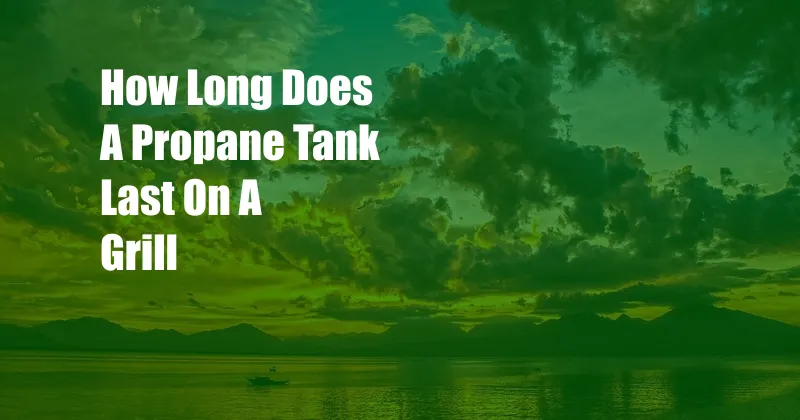
How Long Does a Propane Tank Last on a Grill?
As a grill enthusiast, I’ve often pondered the lifespan of propane tanks. In the midst of a backyard barbecue, nothing’s worse than running out of fuel and having to interrupt the festivities. Through my research and countless grilling experiences, I’ve uncovered the factors influencing propane tank longevity.
Before delving into the specifics, let’s understand the key players involved: British Thermal Units (BTUs) and grill sizes. BTUs measure the energy output of a grill, indicating its heating capacity. Grill sizes, on the other hand, determine the amount of fuel consumed to maintain desired temperatures.
Factors Affecting Propane Tank Life
The duration of a propane tank depends on:
- Grill Size: Larger grills require more propane to heat up and maintain high temperatures.
- BTU Rating: Higher BTU grills consume propane faster due to their increased heat output.
- Cooking Habits: Frequent grilling, extended cooking times, and high-heat cooking methods deplete propane more rapidly.
- Ambient Temperature: Cold weather reduces propane vaporization, leading to lower efficiency and fuel consumption.
- Tank Size: Obviously, larger tanks hold more propane, extending their lifespan.
Estimating Propane Tank Life
Calculating the exact lifespan of a propane tank is not an exact science. However, we can estimate the grilling hours with the following formula:
Grilling Hours = [Tank Capacity (lbs) x 22,500 (BTUs per lb of propane)] / BTU Rating of Grill
For example, a 20-pound tank on a grill with a 30,000 BTU rating would last approximately 15 hours: (20 x 22,500) / 30,000 = 15 hours.
Tips for Extending Propane Tank Life
- Choose the right grill size: Opt for a grill that aligns with your cooking needs to avoid wasting fuel.
- Manage heat settings: Use lower heat settings when possible and avoid prolonged high-heat cooking.
- Cover the grill: When not in use, cover the grill to reduce heat loss and minimize propane consumption.
- Clean the grill: Regular cleaning removes food residue and grease buildup, improving efficiency and reducing fuel usage.
FAQs on Propane Tank Life
Q: How often should I replace my propane tank?
A: The frequency depends on usage and tank size. Monitor propane levels regularly and replace empty tanks before grilling.
Q: Can I transport propane tanks while they’re in use?
A: No. Always turn off the propane and let it cool before transporting to prevent leaks.
Q: What are the signs of a faulty propane tank?
A: Inspect the tank for dents, leaks, or rust. Discontinue use and contact a qualified technician if any issues are detected.
Conclusion
Knowing how long a propane tank lasts on a grill empowers you to plan your grilling sessions effectively. By understanding the factors affecting fuel consumption and implementing our recommended tips, you can maximize the lifespan of your propane tanks, ensuring uninterrupted grilling.
Are you ready to elevate your grilling experience with optimized propane usage? Leave a comment below with your grilling preferences and any questions, and we’ll gladly assist.